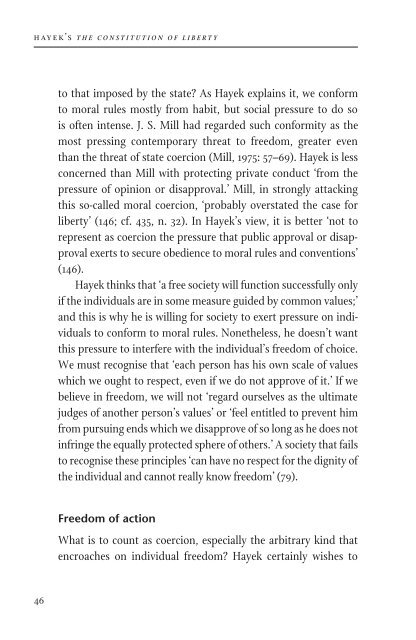Hayek's The Constitution of Liberty - Institute of Economic Affairs
Hayek's The Constitution of Liberty - Institute of Economic Affairs
Hayek's The Constitution of Liberty - Institute of Economic Affairs
Create successful ePaper yourself
Turn your PDF publications into a flip-book with our unique Google optimized e-Paper software.
h ay e k ’ s t h e c o n s t i t u t i o n o f l i b e r t y<br />
i n d i v i d ua l f r e e d o m , c o e r c i o n a n d p r o g r e s s<br />
to that imposed by the state? As Hayek explains it, we conform<br />
to moral rules mostly from habit, but social pressure to do so<br />
is <strong>of</strong>ten intense. J. S. Mill had regarded such conformity as the<br />
most pressing contemporary threat to freedom, greater even<br />
than the threat <strong>of</strong> state coercion (Mill, 1975: 57–69). Hayek is less<br />
concerned than Mill with protecting private conduct ‘from the<br />
pressure <strong>of</strong> opinion or disapproval.’ Mill, in strongly attacking<br />
this so-called moral coercion, ‘probably overstated the case for<br />
liberty’ (146; cf. 435, n. 32). In Hayek’s view, it is better ‘not to<br />
represent as coercion the pressure that public approval or disapproval<br />
exerts to secure obedience to moral rules and conventions’<br />
(146).<br />
Hayek thinks that ‘a free society will function successfully only<br />
if the individuals are in some measure guided by common values;’<br />
and this is why he is willing for society to exert pressure on individuals<br />
to conform to moral rules. Nonetheless, he doesn’t want<br />
this pressure to interfere with the individual’s freedom <strong>of</strong> choice.<br />
We must recognise that ‘each person has his own scale <strong>of</strong> values<br />
which we ought to respect, even if we do not approve <strong>of</strong> it.’ If we<br />
believe in freedom, we will not ‘regard ourselves as the ultimate<br />
judges <strong>of</strong> another person’s values’ or ‘feel entitled to prevent him<br />
from pursuing ends which we disapprove <strong>of</strong> so long as he does not<br />
infringe the equally protected sphere <strong>of</strong> others.’ A society that fails<br />
to recognise these principles ‘can have no respect for the dignity <strong>of</strong><br />
the individual and cannot really know freedom’ (79).<br />
Freedom <strong>of</strong> action<br />
What is to count as coercion, especially the arbitrary kind that<br />
encroaches on individual freedom? Hayek certainly wishes to<br />
protect individuals and their property from physical harm, but<br />
his primary emphasis is on assuring the individual’s freedom <strong>of</strong><br />
action. Inflicting physical harm, or threatening it, is a form <strong>of</strong><br />
coercion, but so is interference with free action. Freedom <strong>of</strong> action<br />
includes economic liberty, but it is wider than this. For Hayek, it<br />
encompasses the individual’s freedom to plan his own life and to<br />
carry out that plan. Recognising that this requires extensive information,<br />
Hayek defines coercion broadly to include the manipulation<br />
<strong>of</strong> a person’s environment by such means as deception<br />
or withholding vital facts. Coercion, in this wider sense, is ‘the<br />
control <strong>of</strong> the essential data <strong>of</strong> an individual’s action by another’<br />
(139).<br />
In extending this freedom to every individual, Hayek implicitly<br />
follows the principle, famously articulated by Kant, that human<br />
individuals are to be regarded as ends and not as a means only. A<br />
person who is coerced no longer pursues his own ends or plan <strong>of</strong><br />
life, but must act according to ends or goals that are imposed by<br />
someone else. In so acting I become merely a means to another’s<br />
end. I still exercise choice, but ‘my mind is made someone else’s<br />
tool, because the alternatives before me have been so manipulated<br />
that the conduct that the coercer wants me to choose becomes<br />
for me the least painful one’ (133). I have been deprived <strong>of</strong> the use<br />
<strong>of</strong> my intelligence and knowledge in the pursuit <strong>of</strong> my own aims<br />
(134).<br />
But why is it beneficial that the individual should be free to<br />
pursue his own ends or life plan? Hayek is somewhat vague about<br />
the benefit that the individual himself gains from such freedom.<br />
He does not justify it as a path to success in amassing property,<br />
winning acclaim, cultivating virtue, or attaining happiness: ‘we<br />
must recognize that we may be free and yet miserable’ (18). Hayek<br />
46<br />
47












